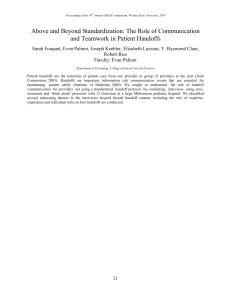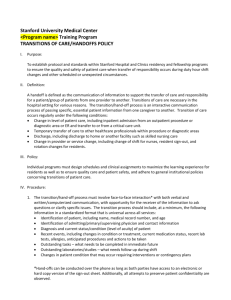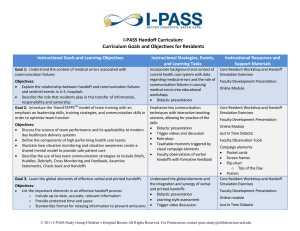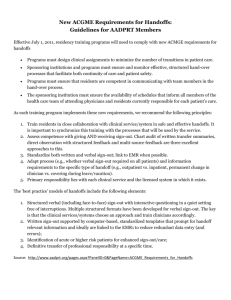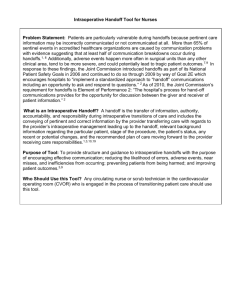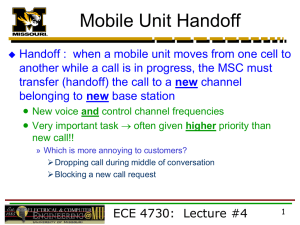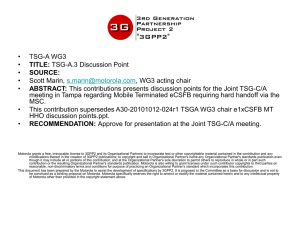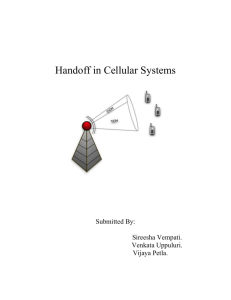HANDOFFS AND DROPPED CALLS
advertisement
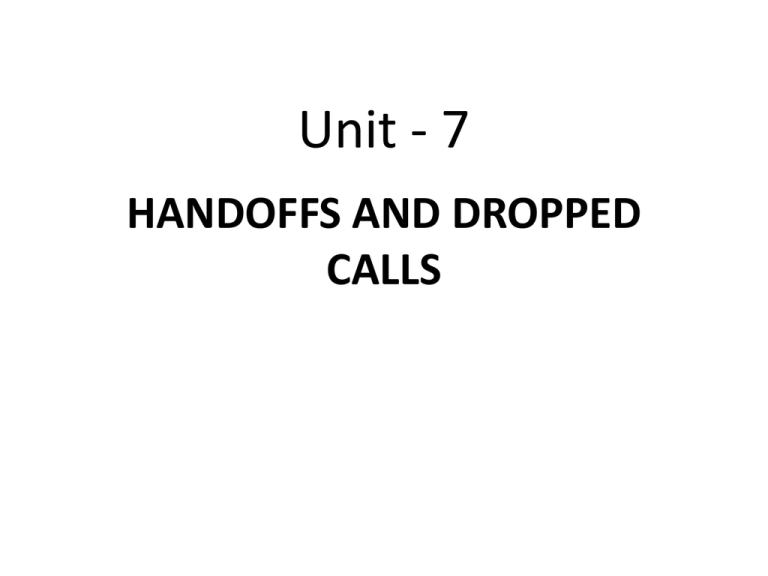
Unit - 7 HANDOFFS AND DROPPED CALLS Why Handoffs? • • • • • Handoff – voice channel Paging channels – Common Control channels value of implementing handoffs size of the cell people talk longer Handoff is needed in two situations Signal Coverage Cells Two Decision-Making Parameters of Handoff Two Decision-Making Parameters of Handoff • Based on – signal strength – carrier-to-interference ratio Type -1 • the signal-strength threshold level for handoff is −100 dBm – noise-limited systems −95 dBm – interference-limited systems Type - 2 • C/I at the cell boundary for handoff should be at a level, 18 dB Type - 1 • • • • Location receiver at each cell site Received signal strength (RSS) RSS = C + I Two situations may occur – I more – I Less • Not accurate Type - 2 • Carrier to Interference Ratio • Two situations occur – C Less – I more • Determining the Probability of Requirement for Handoffs Handoff • Soft Handoff – Make Before Break • Hard Handoff – Break Before Make Number of Hard Handoffs Per Call • 0.2 handoff per call in a 16- to 24-km cell • 1–2 handoffs per call in a 3.2- to 8-km cell • 3–4 handoffs per call in a 1.6- to 3.2-km cell INITIATION OF A HANDOFF INITIATION OF HANDOFF • Signal strength - reverse voice channel • Threshold level - minimum required voice quality • Cell site – MTSO • Unnecessary Handoff • Failure Handoff The velocity of vehicle V and the pathloss slope γ , can be used to determine the value of Δ dynamically Two circumstances where handoffs are necessary but cannot be made Situations • When the mobile unit is located at a signalstrength hole within a cell but not at the boundary • When the mobile unit approaches a cell boundary but no channels in the new cell are available. DELAYING A HANDOFF • A Two-Level Handoff Algorithm • Advantage of Delayed Handoffs – Switching processor – Interference FORCED HANDOFFS A forced handoff is defined as a handoff that would normally occur but is prevented from happening, or a handoff that should not occur but is forced to happen. Handoff • Controlling a Handoff By cell site – threshold level - variation By MSC • Creating a Handof MSC ordering Cellsite – threshold level increase QUEUING OF HANDOFFS • Queuing of handoffs is more effective than two-thresholdlevel handoffs • 1/μ - average calling time in seconds, including new calls and handoff calls in each cell • λ1 - arrival rate (λ1 calls per second) for originating calls • Λ2 - arrival rate (λ2 handoff calls per second) for handoff calls • M1- size of queue for originating calls • M2 -size of queue for handoff calls • N- number of voice channels • a =(λ1 + λ2)/μ • b1 =λ1/μ • b2= λ2/μ Case – 1 • No queuing on either the originating calls or the handoff calls • The blocking for either an originating call or a handoff call is Case-2 • Queuing the originating calls but not the handoff calls • The blocking probability for originating calls is Case -2 • The blocking probability for handoff calls is Case-3 Queuing the handoff calls but not the originating calls POWER-DIFFERENCE HANDOFFS • power difference (∆)
